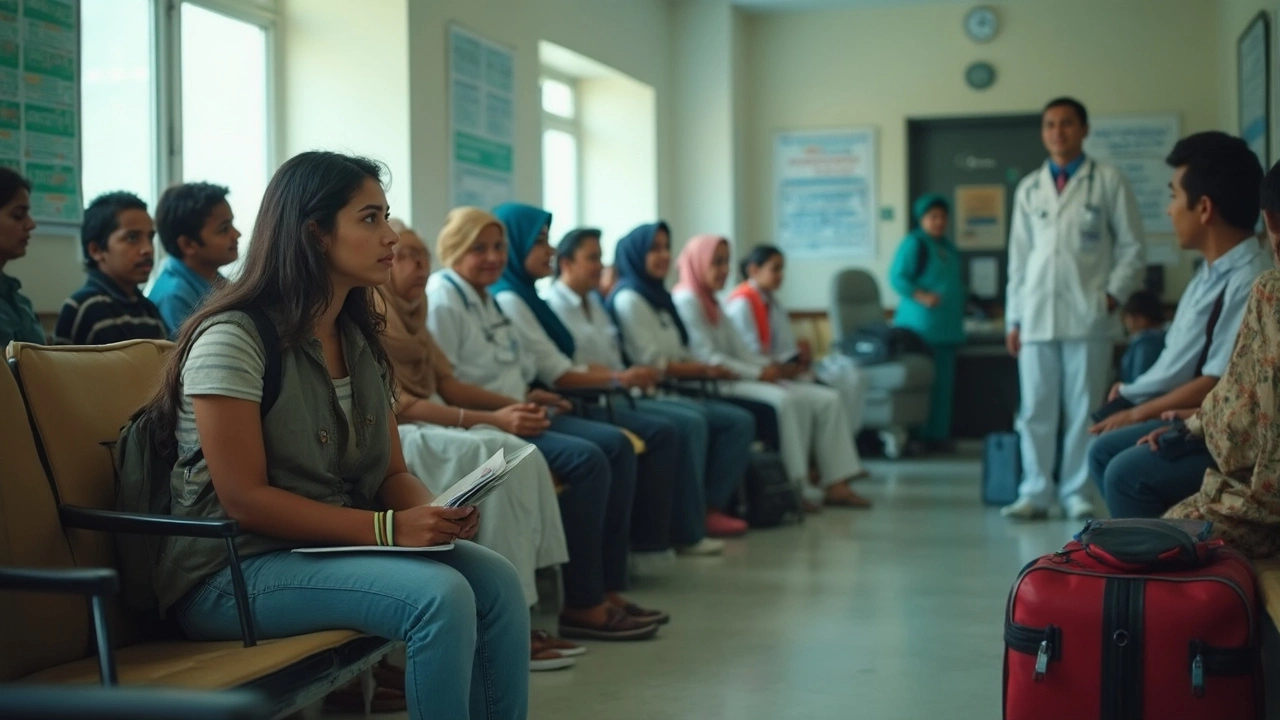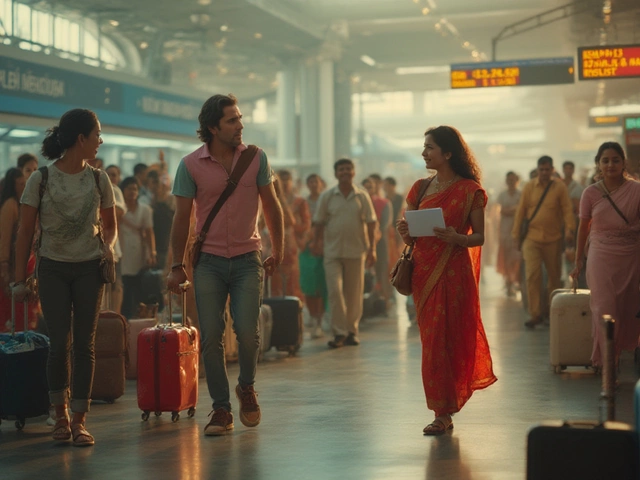
So you’re on vacation, halfway across the planet, and suddenly you catch a nasty stomach bug. Or maybe you sprain your ankle chasing after a tuk-tuk in Bangkok. Getting sick in another country is more common than you’d think, and it’s rarely just a story for Instagram. Tiny problems can feel huge when you can’t find an English-speaking doctor, read the pharmacy labels, or even figure out if your travel insurance covers that weird rash.
Before you panic, let’s talk practical stuff. Most places have clinics and hospitals (some even better than what you’d expect at home), but knowing how to get help can make or break your travel experience. Should you Google the nearest ER or call your travel insurance first? Does your credit card cover medical emergencies? The key is to act quickly, think clearly, and remember that panicking never helps—trust me, I learned that the hard way when Anjali needed antibiotics in Spain and I couldn’t pronounce a single word beyond “paella.”
It’s not just about emergencies, either. Even minor stuff, like getting meds you forgot to pack or finding a doctor for a routine check-up, can get complicated if you don’t prep a little. And if you’re traveling specifically for a medical procedure—as part of the booming medical tourism scene—the checklist grows longer. Want to know what really happens if you get sick abroad and how to get care without losing your mind (or your money)? Read on.
- You’re Sick Abroad: Now What?
- Finding Healthcare When You Don’t Speak the Language
- Understanding Medical Costs and Insurance
- Dealing with Medications and Prescriptions
- Emergencies: When It Gets Serious
- How Medical Tourism Is Changing the Game
You’re Sick Abroad: Now What?
Getting sick overseas can flip your trip upside down. The first thing to do is size up how bad the problem is. If it's a mild headache or stuffy nose, you might be fine popping into a local pharmacy. But if you're doubled over in pain or running a high fever, it’s time to look for medical help.
Don't ignore symptoms thinking they'll magically disappear. In some countries, common bugs can act differently on your immune system. Even a basic infection might get ugly if you don't catch it early. According to the Centers for Disease Control and Prevention (CDC), travelers’ diarrhea, dengue fever, and respiratory infections are the top reasons tourists end up needing medical care abroad.
Here are the steps you should follow if you get sick on your travels:
- Assess the situation: Are your symptoms mild, or do you need urgent help?
- Check your travel insurance: Most international insurance plans come with a helpline. They often have a list of recommended hospitals or clinics—use them, especially in unfamiliar countries.
- Ask your hotel or hosts for local advice: Receptionists or Airbnb hosts know the area and can point you to nearby clinics, some even call ahead for you.
- Use technology to your advantage: Google Maps, TripAdvisor, and even embassy websites list hospitals and English-speaking doctors. There are also apps like Doctoralia or Practo (in Asia) where you can book appointments in English.
- If it’s an emergency: Don’t mess around—dial the local emergency number. It’s not always 911. For example, it’s 112 in most of Europe and 119 in parts of Asia.
If you want a quick comparison of what to expect in different countries when seeking emergency care overseas, check out this handy table:
| Country | Emergency Number | Public vs Private Care |
|---|---|---|
| Spain | 112 | Both good, public slightly slower |
| Thailand | 1669 | Private more tourist-friendly |
| USA | 911 | Private is faster, much more expensive |
| Mexico | 911 | Private generally safer for tourists |
Keep digital and paper copies of your passport, visa, and travel health insurance. Medical staff will likely ask for proof before treating you, unless it’s a dire emergency. If you’re just feeling under the weather, a pharmacy might sort you out, but for anything more, play it safe and see a doctor.
Trust your gut. If you feel something is off, don’t brush it off. Medical tourism isn’t just about fancy surgeries—it’s your game plan for fixing the rough stuff when you’re far from home.
Finding Healthcare When You Don’t Speak the Language
Getting sick when English isn't the main language can feel like you're in a real-life episode of a survival show. But you’re not doomed—millions of travelers get by every year, sometimes with just hand gestures and Google Translate. Let’s get practical about getting sick abroad when you’re flying solo without the language.
Most hospitals in big cities in Europe, Asia, or even Latin America usually have some English-speaking staff because they’re used to foreign visitors. But walk into a small-town clinic, and you might be stuck miming diarrhea or pointing at your swollen ankle. Even in places like Japan or France, where healthcare is top-tier, don’t expect much English outside major tourist hubs.
Here’s how to make things easier:
- Use your phone. Google Translate has a solid medical vocabulary. Download the language pack for offline use before you go—spotty wifi can ruin your day.
- Learn basic medical words in the local language: “pain,” “allergy,” “doctor,” “pharmacy.” Jot them down or save screenshots.
- Keep a medication list and allergies info handy, written in both your language and the local one. Pharmacies are often your fastest option for mild sickness—just like when I got a cold in Thailand, and showing them the word for “cough syrup” did the trick.
- Most embassies have a list of recommended clinics or English-speaking doctors. Save your embassy’s contact info in your phone.
Lots of travelers underestimate how comforting it is to hear an English speaker when you’re feeling terrible. In fact, a 2018 survey found that over 55% of U.S. travelers picked doctors based only on language comfort, not hospital reputation.
| Country | % of Clinics with English-Speaking Staff |
|---|---|
| Thailand (Bangkok) | 80% |
| Germany (Berlin) | 68% |
| Japan (Tokyo) | 45% |
| Bali, Indonesia | 75% |
If all else fails, don’t be embarrassed to act things out. Doctors are used to interpreting wacky travel stories. Just remember to keep your travel insurance details, passport, and phone on you at all times—nothing smooths things over in a foreign clinic like whipping out the right paperwork. That’s the real magic when dealing with medical tourism or just a surprise bug overseas.
Understanding Medical Costs and Insurance
The second you hear the bill total in a hospital abroad, you might wish you’d paid more attention before your trip. Medical tourism is a huge trend because healthcare prices swing wildly between countries. For example, a quick ER visit in the U.S. can cost over $1,000 without insurance. In Thailand or India, the same thing could be under $50. Sounds crazy, but it’s real.
If you have travel health insurance, check the fine print before you go. Not all policies cover every type of illness or emergency care overseas. Look for things like direct billing (so you don’t pay out of pocket first), coverage for evacuation, and whether they cover pre-existing conditions. It’s a bummer to find out too late that your broken wrist isn’t covered because you forgot to list your old sports injury on the form.
Your regular health insurance probably covers nothing outside your home country. There are exceptions—some premium plans and select European cards might, but for most people, separate international insurance is essential. If you’re already traveling and didn’t get coverage, some companies let you buy a policy from abroad (for a slightly higher premium and possibly with a waiting period).
| Country | Average Private Hospital Visit Cost |
|---|---|
| USA | $1,200+ |
| Mexico | $50-$150 |
| Thailand | $30-$80 |
| Spain | $100-$300 |
It’s easy to assume your trip’s already protected because you used a credit card. Some cards do toss in basic emergency and travel health tips coverage, but there are tons of restrictions. Lost luggage? Usually covered. Complex surgery? Probably not, unless you read every page of the fine print and signed up for extras.
Quote time—here’s what the CDC says:
“Travelers are strongly encouraged to purchase travel insurance that covers overseas medical care and medical evacuation, even if they already have coverage at home.”
If you do have to pay up front, keep every document and receipt. Your insurance will want ridiculously detailed proof if you make a claim, down to the prescription slips or even parking tickets from the hospital. Filing claims can be a pain, so scan or snap photos of everything just in case.
- Contact your insurer’s emergency hotline before any treatment if possible—they’ll tell you which hospitals are approved.
- Double-check for hidden exclusions like adventure sports, alcohol incidents, or “high-risk” destinations.
- Don’t barter with hospital cashiers; ask for an itemized bill.
Nothing feels less glamorous than arguing hospital prices in another language, so a little prep goes a long way. Don’t forget: different countries, different systems, totally different costs. Always check before you need it, not after you’re already sick and tired.

Dealing with Medications and Prescriptions
Getting the medicine you need when you’re traveling can feel like its own adventure. The rules around medications and prescriptions change a lot from country to country. Some stuff that’s over the counter at home might require a prescription elsewhere, or worse, could actually be illegal. You don’t want to get stuck at airport security because you forgot to pack your doctor’s note with your meds.
Here’s what you should do before you leave:
- Pack enough of your regular prescription meds to last the whole trip, plus some extras in case your return is delayed.
- Bring the original packaging with your name, the prescription label, and a copy of the prescription from your doctor (preferably in English and in the official language of your destination).
- Double-check if any of your meds need special approval or are restricted in your destination country—a quick search on embassy websites can save you trouble.
Ran out of meds while abroad? Most countries have pharmacies (sometimes called chemists or apothecaries), but don’t expect the pharmacist to recognize a U.S. or UK prescription off the bat. In some places, you can buy antibiotics or painkillers straight from the counter—no paper needed. But in others, the pharmacist won’t hand you Advil without proper local paperwork.
If you need to see a doctor for a new prescription, try these tips:
- Use your travel insurance hotline—they often have a list of English-speaking doctors.
- Ask your hotel reception or the local expat community for clinic recommendations.
- Keep a list of your medications (including brand and generic names, just in case what you call it isn’t what they call it abroad).
Here’s a quick breakdown of how easy it can be to get common medications in popular medical tourism destinations:
| Country | Pharmacy System | Prescription Needed? |
|---|---|---|
| Mexico | Abundant local pharmacies; many meds over the counter | Not always (antibiotics sometimes OTC) |
| Thailand | Big chain pharmacies in cities; English often spoken | Some meds OTC, but controlled drugs definitely need a script |
| Spain | Pharmacies everywhere, green neon cross sign | Prescription needed for most stuff, but pharmacists can sometimes help in urgent cases |
Bottom line—don’t wing it with your health on the road. A little prep goes a long way. And don’t assume what’s easy to buy at home works the same everywhere else. Double-check the details before you travel, and always keep a backup of your prescriptions at hand, even if it’s just a photo on your phone.
Emergencies: When It Gets Serious
No one books a trip expecting a medical emergency, but it happens more than you might think. Cardiac events, traffic accidents, and food poisoning gone wrong top the list. Your first move? Don't hesitate. Every second counts in a real emergency, especially if you’re in a country where medical systems work differently.
Dialing an ambulance isn’t always as simple as calling 911. Different countries use different numbers. For example, 112 works in most of Europe, while 999 is for the UK, and 000 is for Australia. Jot down the local emergency number in your phone before you even leave the hotel.
Once you reach a hospital, everything can feel chaotic. Some countries demand proof of insurance or payment upfront—even for life-saving care. Cash or credit cards may be required before treatment begins. If you have international insurance, show your card right away. No insurance? Don’t argue—pay as needed and save the receipts for later claims.
Here’s a practical checklist for a serious emergency abroad:
- Call the local emergency number or ask someone nearby for help—most folks will jump in if you look unwell.
- Carry copies of your passport, travel insurance, and any medical info (like allergies or current meds) on your phone or in your wallet.
- Contact your travel insurance rep as soon as you’re able. They can advise which hospital is best and help sort billing or evacuation if needed.
- Don’t expect all hospital staff to speak English; translation apps are lifesavers in these moments.
- If you’re admitted, let someone back home know. You’d be surprised how often people forget.
Here’s a quick peek at some common emergency numbers and their regions:
| Country/Region | Emergency Number |
|---|---|
| Europe (most countries) | 112 |
| United Kingdom | 999 |
| USA/Canada | 911 |
| Australia | 000 |
| India | 112/102 (Ambulance) |
| Japan | 119 |
The truth: Being prepared for emergency care overseas isn’t just paranoia—it’s smart travel. Most cases end up just fine, but if things get hairy, knowing these basics keeps a bad day from turning into your worst nightmare abroad.
How Medical Tourism Is Changing the Game
Medical tourism used to sound like something only rich folks with private jets could afford. But now, it’s on the radar for a lot of regular travelers—and not just for big surgeries. Plenty of people book trips overseas for dental work, eye procedures, physical therapy, or even just a check-up because costs are way lower. According to the Medical Tourism Association, over 14 million people travel for health care every year. The reasons? Better technology, long hospital wait times back home, and, let’s be honest, the price tag.
Here’s the real deal: Many countries have invested a ton in world-class clinics and hospitals that focus on foreign patients. Countries like Thailand, India, Mexico, and Turkey have become hotspots, offering packages that include airport pick-up, translators, and even recovery stays by the beach. Some local clinics partner with travel agencies to handle your whole trip—right down to sending you home with digital copies of your medical records in English.
The money part is a biggie. Procedures like dental implants, heart bypass surgery, or cosmetic fixes can be 50–80% cheaper abroad—even after you factor in your flight and hotel. There’s usually less paperwork, shorter wait times, and sometimes quicker follow-up. Here’s a quick comparison:
| Procedure | Average Cost (US) | Average Cost (Mexico) | Average Cost (Thailand) |
|---|---|---|---|
| Heart Bypass | $120,000 | $35,000 | $15,000 |
| Dental Implant | $4,500 | $1,500 | $1,200 |
| Hip Replacement | $40,000 | $12,000 | $10,000 |
So, what should you look out for if you’re thinking about this kind of medical tourism?
- Check credentials. Hospitals catering to foreigners often flash international accreditation. Double-check those claims online.
- Health insurance is a must, but don’t assume your plan at home covers care abroad—many don’t. Look into special international medical insurance or ask your provider about add-ons for emergency care overseas.
- Understand the risks. If something goes wrong, fixing it back home can get expensive fast. Research outcomes, read real patient reviews, and always factor in follow-up care.
The bottom line is, medical tourism is making it possible for more people to have choices. You could be getting treated by top specialists in modern hospitals at a fraction of the cost. As long as you do your homework, it can be safe, smart, and even a little bit of an adventure.





Rohan Talvani
I am a manufacturing expert with over 15 years of experience in streamlining production processes and enhancing operational efficiency. My work often takes me into the technical nitty-gritty of production, but I have a keen interest in writing about medicine in India—an intersection of tradition and modern practices that captivates me. I strive to incorporate innovative approaches in everything I do, whether in my professional role or as an author. My passion for writing about health topics stems from a strong belief in knowledge sharing and its potential to bring about positive changes.
view all postsWrite a comment